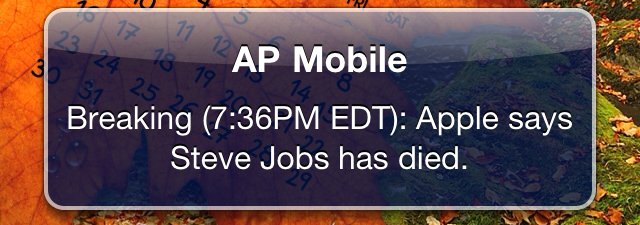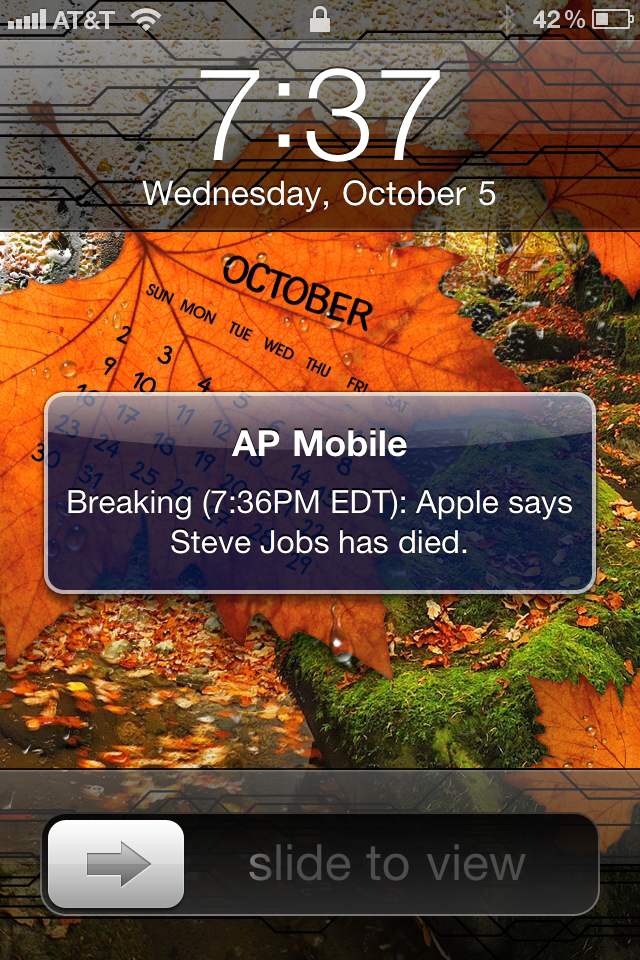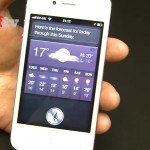
Thoughts on Steve Jobs (1955-2011)
Steve Jobs (1955-2011)
This is how I found out about Steve Jobs’ death this evening, on my iPhone:

President Obama himself just released a statement that, among other things, said:
And there may be no greater tribute to Steve’s success than the fact that much of the world learned of his passing on a device he invented.
I’m glad I had enough presence of mind to snap that screenshot on the left. There’s just a bit of irony in that snap shot.
I don’t really know why I feel the need to type out a little blog post on Steve Jobs’ passing. I don’t consider myself the typical Apple “fanboy.” I do enjoy using my iPhone and an iPad, but I work on Windows servers and workstations. I am Microsoft Certified. I am playing with the developer preview of Windows 8. I’ve always been a “Microsoftie.” But… hold on… that’s not 100% true.
Back in the 80’s, before I became a full-fledged “Microsoftie,” I was an Amiga fanatic.
Those computing days in the 80’s were like the wild west of the tech days. To rip off a line from the Hitchhiker’s Guide to the Galaxy, by Douglas Adams, in those days, men were real men, women were real women, and small furry creatures from Alpha Centauri, were real small furry creatures from Alpha Centauri. At the time there were several different big names in the personal computer field, most of them big names who were famous for hardware development. IBM, Commodore, Apple, Tandy, and others, all mainly focused on hardware. No one really saw the benefit of software until Microsoft came along. What they sold was abstract. “An Operating System? License an Operating System? Why on earth would you want to do that? It’s just a bunch of 1’s and 0’s! The money’s in hardware!” Well, we see where that ended up. The one statement I would like to say about 80’s computing is this: We, as Americans, really like to romanticize when it comes to our history. Contrary to what Disney World and CNN will tell you it wasn’t “the solution comes in 1977 in of all places a garage in California.” There was an awful lot of battling that went on in the 1980’s to gain control of the personal computer market, and Steve Jobs was only one of many major players.
My second computer was a Commodore 128 personal computer and when the time came for the next computer, it was clear where the market was headed. Bigger, faster, stronger… I had gone from a PC with 16K of memory to one with 128K of memory and it was only going up from there. The hardware life cycle had begun. I specifically remember picking apart a couple of editions of COMPUTE! magazines trying to decide what my computer was going to be. It had come down to a choice between an Apple IIGS and a Commodore-Amiga 2000. As I’ve previously mentioned, I ended up going the Amiga route. I was a big fan of Amiga computers from the beginning. It was intuitive. I’ve spoken about it before on my blog, so I won’t get into all of that again, but my point of saying all of that is to say this: Brand loyalty amongst technology enthusiasts is fervent. It’s almost religious, in a sense. I’ve often heard Apple fanatics referred to as a “cult” and I can see how that word applies. I always wanted to see the Amiga computer succeed because I knew how good the technology was. And I was truly getting sick of hearing about IBM and the clones and compatibles finally being able to do, in the 90’s, what the Amiga was doing in the 80’s. I guess you could say I could “Think Different,” I just did it differently.
Anyway, the Apple IIGS was the closest I got to buying an actual Apple product for the next 20 years. I had firmly sided in the Amiga camp in the late 80’s, and for most of the 2000’s was trying to avoid Apple products by fiddling with Windows-based music players. (By the way, does anyone remember “Plays For Sure?” Yeah, that didn’t work out. Probably because it very rarely “played at all.”) On December 15, 2008 I bought my first ever Apple product, an iPhone 3G. Even then I was leaning towards a Windows mobile phone because I wanted it to be Microsoft. I wanted Exchange syncing in particular. Once I learned the iPhone could do it, I relented.
I have been quite pleased with the way Apple products “just work.” I probably should have taken the hint from Douglas Adams back in 1989 when he wrote Frank the Vandal. Any computer guru who wants to know how regular people feel about computers should read that short story. My final thought is simply this: Steve Jobs and Apple struck gold with the iPod, the iPhone, and recently, the iPad. When the iPhone 4S ships in just a few days, it will be a success. The new features like Siri are great for sure, but keeping things simple and intuitive have been the keys to Apple’s success all along. Steve had a knack for figuring out exactly what people wanted before they even knew they wanted it. And it just worked.
I can’t tell you anything at all about another man’s soul. And I don’t want to think too hard “religiously” about this, but I truly hope that somehow, somewhere, Steve Jobs is having a great chat with Douglas Adams right now, and I’d love to hear that conversation!
I would also recommend this video that’s been quoted often this evening on television news. I’ve heard it several times before, but it has a new meaning for me tonight. This past weekend I received a quote which said “Focusing on the tiniest details, finding magic in even the smallest inspirations, embracing the briefest moments-that’s where passion is.” — from The Power of Small by Linda Thaier. I think Apple has dominated in finding magic in small inspirations, and as they continue on their quest to “Think Different” I wish them the best.
Jason McIntyre
Jason is an IT specialist and systems engineer who stares frequently at screens of various sizes, often with a puzzled expression on his face. He presses buttons with letters and numbers on them until tiny dots illuminate on a flat screen in front of him and appear in a manner and order that he (or someone who is paying him) finds pleasing.



No Comment! Be the first one.